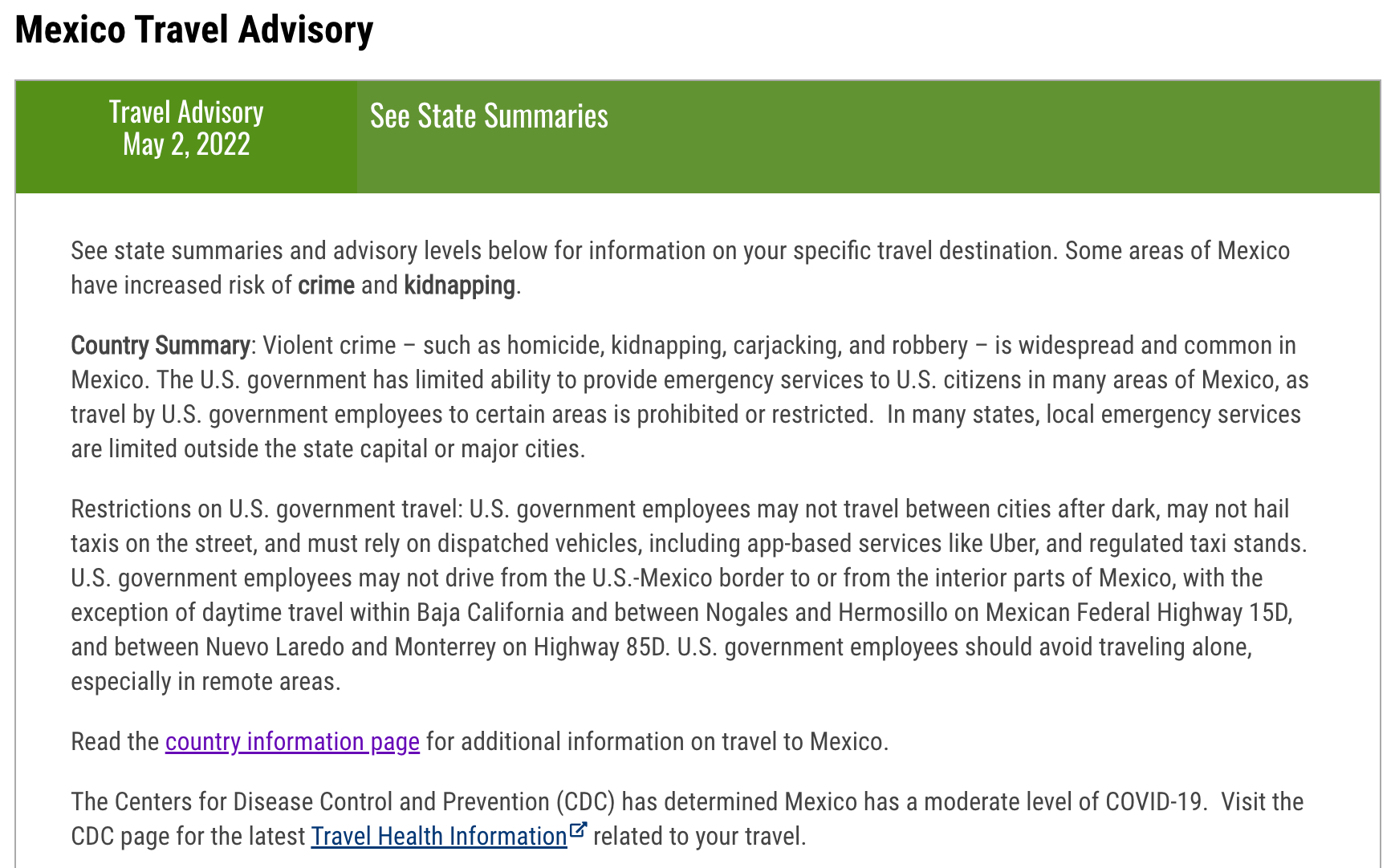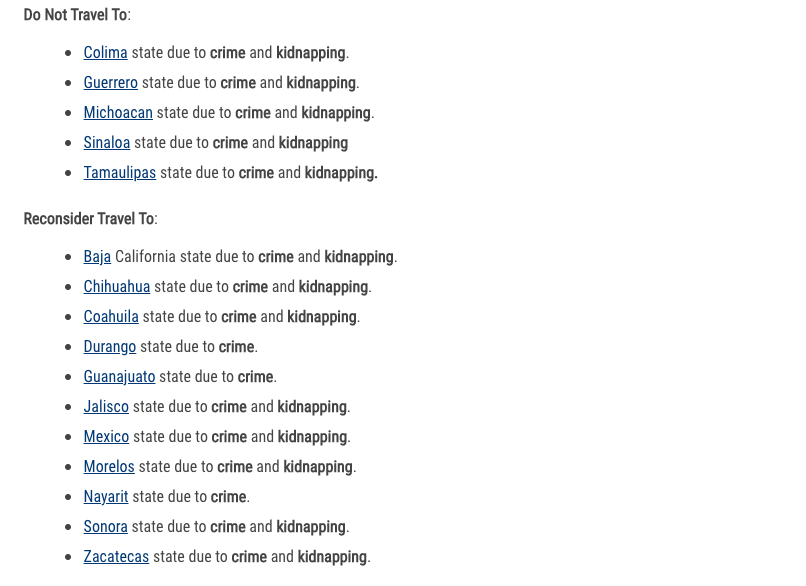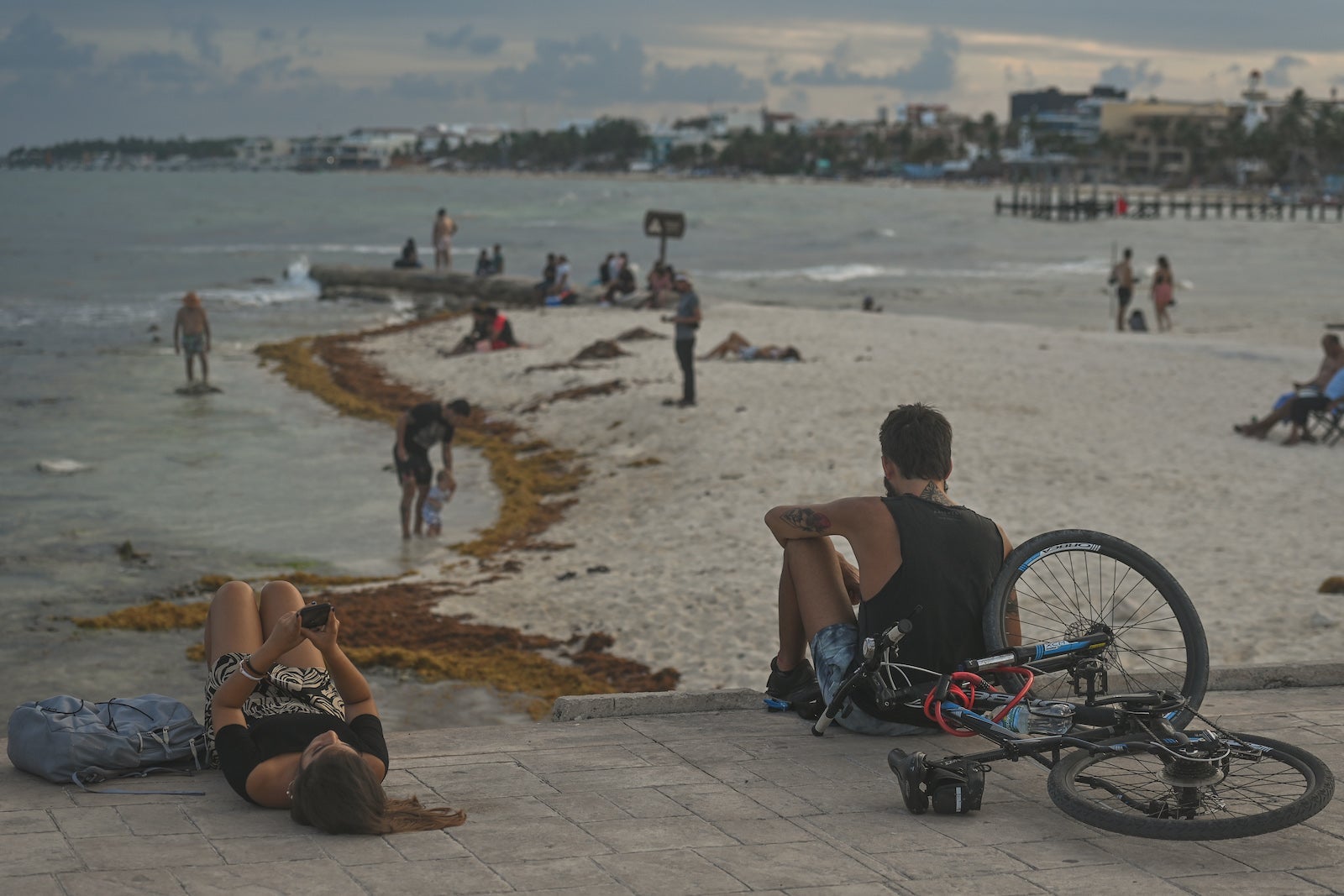Travelers to Mexico now see state-specific travel warnings from the US government
Travelers to Mexico heeding U.S. State Department warnings should be aware of new state-specific alerts for various parts of Mexico.
The State Department's official travel warnings for Mexico should be used by travelers to evaluate safety concerns in specific Mexican states, based on a breakdown of risk indicators such as crime and kidnapping for specific destinations, rather than the country as a whole.
While the State Department normally issues a Level 1 to 4 warning for each country in the world based on concern for the overall safety for travelers, the travel advisory for Mexico was last updated as "Other" on May 2.

Per a State Department official, the change for Mexico warnings is a result of the State Department shifting gears last month away from COVID-19 concerns, which is currently the focus of warnings from the US Centers for Disease Control and Prevention (CDC).
"In March 2021, the Department updated its Travel Advisory framework to more heavily weigh the CDC's COVID-19 Travel Health Notices (THN) levels," a State Department official said. "This meant that from March 2021 to April 2022, our Travel Advisory levels were in most cases directly correlated to the CDC's COVID-19 THN levels."
State Travel Advisories no longer match the CDC's COVID-19 Travel Health Notice levels as of April, which is when the CDC removed every country from its highest Level 4: Do Not Travel warning in an effort to reserve that highest alert level for limited circumstances.
"The Department of State's goal is that U.S. citizens planning travel to Mexico focus on the particular area of Mexico to which they will be traveling," they said.

Read more: The difference between CDC and State Department travel warnings
Travelers should continue to view Mexican state-specific advisories like they do country advisories, as they are based on risk factors which include the possibility of tourists encountering concerns related to crime, terrorism, kidnapping, hostage-taking, civil unrest, natural disasters and health.

Mexico's current warning advises travelers should be aware of "widespread and common violent crime – such as homicide, kidnapping, carjacking, and robbery," while also noting that the U.S. government has limited ability to provide emergency services to U.S. citizens in many areas of Mexico since travel by government employees to certain areas is prohibited or restricted.
"In many states, local emergency services are limited outside the state capital or major cities," the warning reads.
Additionally, the State Department says travelers should not currently travel to, or should reconsider or exercise increased caution when traveling to 30 of the 32 listed areas.

The Department is currently advising Americans to avoid traveling to the regions of Colima, Guerrero, Michoacan, Sinaloa and Tamaulipas "due to crime and kidnapping," while asking tourists to "reconsider travel" to Baja California, Nayarit and Mexico State, among other areas. The language regarding travel to those states has not changed since April but has been expanded to include additional territories.
Earlier this week, Mexico Tourism Secretary Miguel Torruco Marqués and U.S. Ambassador Rena Bitter, the Undersecretary of State for Consular Affairs, discussed the State Department's approach to travel advisories for Mexico, which for much of the pandemic, has warned Americans of travel to certain parts of Mexico due to an increased risk of crime.
Read more: UPDATE: Using new ranking system, CDC removes every country from 'do not travel' list
Marqués reportedly asked the State Department to differentiate between isolated acts of violence that occur near tourist destinations and how those events are positioned as affecting the likelihood of crime visitors may face overall, such as how an event like last week's death of two people in a bar in Cancun ultimately factors into the government's weekly travel advisories.
The tourist secretary pointed out that "some isolated cases of insecurity are found several kilometers from tourist destinations," according to local reporting.
This recent conversation between government officials follows the deployment of 6,000 troops in Cancun, part of an increased security presence in response to crime and drug trafficking issues seen this year, including two fatal shootings in January involving Canadian tourists at a five-star hotel in Playa del Carmen and another incident that killed a bar manager at a nearby beach club.
In addition to the State Department, the U.S. Embassy and Consulates in Mexico, which regularly issues safety updates regarding travel to Mexico, has also issued separate enhanced warnings for travelers this year, including in March when they told Spring Break goers to consider the risk of crime, sexual assault and illegal drug use in popular tourist destinations.
Bottom line
Travel advisories issued by the State Department and those warnings related to COVID-19 via the CDC should be taken for what they are — an official warning from the U.S. government. Traveling abroad always involves an inherent amount of risk as you are stepping off American soil.
"We are committed to providing U.S. citizens with clear, timely, and reliable information about every country in the world so they can make informed travel decisions," the State Department official said. "We provide comprehensive safety and security information for every country in the world to help citizens assess the risks of travel."
Should you choose to travel to a country with an elevated travel warning, note that you may not be able to receive assistance from the U.S. government due to limited services being available.
Related: Airlines concerned about safety in Mexico City's airspace
TPG featured card
Rewards
| 4X | Earn 4X Membership Rewards® points per dollar spent on purchases at restaurants worldwide, on up to $50,000 in purchases per calendar year, then 1X points for the rest of the year. |
| 4X | Earn 4X Membership Rewards® points per dollar spent at US supermarkets, on up to $25,000 in purchases per calendar year, then 1X points for the rest of the year. |
| 3X | Earn 3X Membership Rewards® points per dollar spent on flights booked directly with airlines or on AmexTravel.com. |
| 2X | Earn 2X Membership Rewards® points per dollar spent on prepaid hotels and other eligible purchases booked on AmexTravel.com. |
| 1X | Earn 1X Membership Rewards® point per dollar spent on all other eligible purchases. |
Intro offer
Annual Fee
Recommended Credit
Why We Chose It
There’s a lot to love about the Amex Gold. It’s a fan favorite thanks to its fantastic bonus-earning rates at restaurants worldwide and at U.S. supermarkets. If you’re hitting the skies soon, you’ll also earn bonus Membership Rewards points on travel. Paired with up to $120 in Uber Cash annually (for U.S. Uber rides or Uber Eats orders, card must be added to Uber app and you can redeem with any Amex card), up to $120 in annual dining statement credits to be used with eligible partners, an up to $84 Dunkin’ credit each year at U.S. Dunkin Donuts and an up to $100 Resy credit annually, there’s no reason that foodies shouldn’t add the Amex Gold to their wallet. These benefits alone are worth more than $400, which offsets the $325 annual fee on the Amex Gold card. Enrollment is required for select benefits. (Partner offer)Pros
- 4 points per dollar spent on dining at restaurants worldwide and U.S. supermarkets (on the first $50,000 in purchases per calendar year; then 1 point per dollar spent thereafter and $25,000 in purchases per calendar year; then 1 point per dollar spent thereafter, respectively)
- 3 points per dollar spent on flights booked directly with the airline or with amextravel.com
- Packed with credits foodies will enjoy
- Solid welcome bonus
Cons
- Not as useful for those living outside the U.S.
- Some may have trouble using Uber and other dining credits
- You may be eligible for as high as 100,000 Membership Rewards® Points after you spend $6,000 in eligible purchases on your new Card in your first 6 months of Card Membership. Welcome offers vary and you may not be eligible for an offer. Apply to know if you’re approved and find out your exact welcome offer amount – all with no credit score impact. If you’re approved and choose to accept the Card, your score may be impacted.
- Earn 4X Membership Rewards® points per dollar spent on purchases at restaurants worldwide, on up to $50,000 in purchases per calendar year, then 1X points for the rest of the year.
- Earn 4X Membership Rewards® points per dollar spent at US supermarkets, on up to $25,000 in purchases per calendar year, then 1X points for the rest of the year.
- Earn 3X Membership Rewards® points per dollar spent on flights booked directly with airlines or on AmexTravel.com.
- Earn 2X Membership Rewards® points per dollar spent on prepaid hotels and other eligible purchases booked on AmexTravel.com.
- Earn 1X Membership Rewards® point per dollar spent on all other eligible purchases.
- $120 Uber Cash on Gold: Add your Gold Card to your Uber account and get $10 in Uber Cash each month to use on orders and rides in the U.S. when you select an American Express Card for your transaction. That’s up to $120 Uber Cash annually. Plus, after using your Uber Cash, use your Card to earn 4X Membership Rewards® points for Uber Eats purchases made with restaurants or U.S. supermarkets. Point caps and terms apply.
- $84 Dunkin' Credit: With the $84 Dunkin' Credit, you can earn up to $7 in monthly statement credits after you enroll and pay with the American Express® Gold Card at U.S. Dunkin' locations. Enrollment is required to receive this benefit.
- $100 Resy Credit: Get up to $100 in statement credits each calendar year after you pay with the American Express® Gold Card to dine at U.S. Resy restaurants or make other eligible Resy purchases. That's up to $50 in statement credits semi-annually. Enrollment required.
- $120 Dining Credit: Satisfy your cravings, sweet or savory, with the $120 Dining Credit. Earn up to $10 in statement credits monthly when you pay with the American Express® Gold Card at Grubhub, The Cheesecake Factory, Goldbelly, Wine.com, and Five Guys. Enrollment required.
- Explore over 1,000 upscale hotels worldwide with The Hotel Collection and receive a $100 credit towards eligible charges* with every booking of two nights or more through AmexTravel.com. *Eligible charges vary by property.
- No Foreign Transaction Fees.
- Annual Fee is $325.
- Terms Apply.
Rewards Rate
| 4X | Earn 4X Membership Rewards® points per dollar spent on purchases at restaurants worldwide, on up to $50,000 in purchases per calendar year, then 1X points for the rest of the year. |
| 4X | Earn 4X Membership Rewards® points per dollar spent at US supermarkets, on up to $25,000 in purchases per calendar year, then 1X points for the rest of the year. |
| 3X | Earn 3X Membership Rewards® points per dollar spent on flights booked directly with airlines or on AmexTravel.com. |
| 2X | Earn 2X Membership Rewards® points per dollar spent on prepaid hotels and other eligible purchases booked on AmexTravel.com. |
| 1X | Earn 1X Membership Rewards® point per dollar spent on all other eligible purchases. |
Intro Offer
You may be eligible for as high as 100,000 Membership Rewards® Points after spending $6,000 in eligible purchases on your new Card in your first 6 months of Membership. Welcome offers vary and you may not be eligible for an offer.As High As 100,000 points. Find Out Your Offer.Annual Fee
$325Recommended Credit
Credit ranges are a variation of FICO® Score 8, one of many types of credit scores lenders may use when considering your credit card application.Excellent to Good
Why We Chose It
There’s a lot to love about the Amex Gold. It’s a fan favorite thanks to its fantastic bonus-earning rates at restaurants worldwide and at U.S. supermarkets. If you’re hitting the skies soon, you’ll also earn bonus Membership Rewards points on travel. Paired with up to $120 in Uber Cash annually (for U.S. Uber rides or Uber Eats orders, card must be added to Uber app and you can redeem with any Amex card), up to $120 in annual dining statement credits to be used with eligible partners, an up to $84 Dunkin’ credit each year at U.S. Dunkin Donuts and an up to $100 Resy credit annually, there’s no reason that foodies shouldn’t add the Amex Gold to their wallet. These benefits alone are worth more than $400, which offsets the $325 annual fee on the Amex Gold card. Enrollment is required for select benefits. (Partner offer)Pros
- 4 points per dollar spent on dining at restaurants worldwide and U.S. supermarkets (on the first $50,000 in purchases per calendar year; then 1 point per dollar spent thereafter and $25,000 in purchases per calendar year; then 1 point per dollar spent thereafter, respectively)
- 3 points per dollar spent on flights booked directly with the airline or with amextravel.com
- Packed with credits foodies will enjoy
- Solid welcome bonus
Cons
- Not as useful for those living outside the U.S.
- Some may have trouble using Uber and other dining credits
- You may be eligible for as high as 100,000 Membership Rewards® Points after you spend $6,000 in eligible purchases on your new Card in your first 6 months of Card Membership. Welcome offers vary and you may not be eligible for an offer. Apply to know if you’re approved and find out your exact welcome offer amount – all with no credit score impact. If you’re approved and choose to accept the Card, your score may be impacted.
- Earn 4X Membership Rewards® points per dollar spent on purchases at restaurants worldwide, on up to $50,000 in purchases per calendar year, then 1X points for the rest of the year.
- Earn 4X Membership Rewards® points per dollar spent at US supermarkets, on up to $25,000 in purchases per calendar year, then 1X points for the rest of the year.
- Earn 3X Membership Rewards® points per dollar spent on flights booked directly with airlines or on AmexTravel.com.
- Earn 2X Membership Rewards® points per dollar spent on prepaid hotels and other eligible purchases booked on AmexTravel.com.
- Earn 1X Membership Rewards® point per dollar spent on all other eligible purchases.
- $120 Uber Cash on Gold: Add your Gold Card to your Uber account and get $10 in Uber Cash each month to use on orders and rides in the U.S. when you select an American Express Card for your transaction. That’s up to $120 Uber Cash annually. Plus, after using your Uber Cash, use your Card to earn 4X Membership Rewards® points for Uber Eats purchases made with restaurants or U.S. supermarkets. Point caps and terms apply.
- $84 Dunkin' Credit: With the $84 Dunkin' Credit, you can earn up to $7 in monthly statement credits after you enroll and pay with the American Express® Gold Card at U.S. Dunkin' locations. Enrollment is required to receive this benefit.
- $100 Resy Credit: Get up to $100 in statement credits each calendar year after you pay with the American Express® Gold Card to dine at U.S. Resy restaurants or make other eligible Resy purchases. That's up to $50 in statement credits semi-annually. Enrollment required.
- $120 Dining Credit: Satisfy your cravings, sweet or savory, with the $120 Dining Credit. Earn up to $10 in statement credits monthly when you pay with the American Express® Gold Card at Grubhub, The Cheesecake Factory, Goldbelly, Wine.com, and Five Guys. Enrollment required.
- Explore over 1,000 upscale hotels worldwide with The Hotel Collection and receive a $100 credit towards eligible charges* with every booking of two nights or more through AmexTravel.com. *Eligible charges vary by property.
- No Foreign Transaction Fees.
- Annual Fee is $325.
- Terms Apply.

